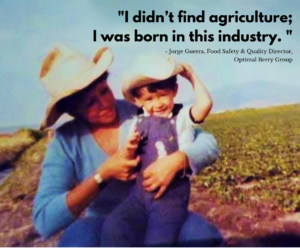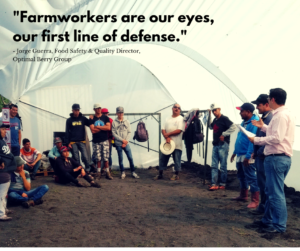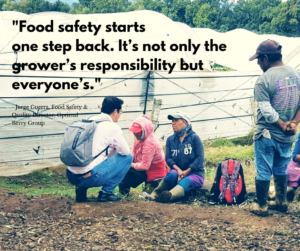Meet the People Behind EFI: Jorge Guerra, Food Safety & Quality Director, Optimal Berry Group
Agriculture is a natural fit for Jorge Guerra. The food safety and quality executive was born and raised in the strawberry fields of Jacona, Michoacán. In 2005, he left his father’s farm to gain experience with a global fruit preparation company.
Years later he returned to his roots and co-founded Optimal Berry Group, bringing together the best elements of the many agribusiness operations he had been part of during the last decade.
Optimal Berry Group, The agriculture cooperative and exporter, is in the process of certifying its strawberry production under Equitable Food Initiative (EFI).
In an interview with EFI, Guerra spoke about the changes EFI Leadership Teams have implemented and how bringing a voice to workers has had a positive impact.
Q: When did you begin your journey in agriculture?
A: I didn’t find agriculture; I was born in this industry. My father was a producer here in Jacona, Michoacán. Strawberries were his main product, so I spent my childhood working in the strawberry fields.
I understand how difficult it is for a strawberry to be placed in a supermarket for someone to eat. There’s so much work behind a berry. When you grow up in that environment, you manage your company quite differently. That’s why Optimal Berry it’s a different type of operation—not only in essence, but in its roots.
Q: Why is it important to train agricultural workers in food safety standards?
A: Workers are our direct contact with the fruit. Any contamination could cause an outbreak. Any person harvesting could unpin a food safety issue.
It is important not just to demand safety standards, but to explain them. That’s the key to creating a Food Safety culture. You can have a great PowerPoint presentation about food safety, but if you don’t generate consciousness, then your work was in vain.
Quality is something you can easily see with your bare eyes—the shape, texture and color of strawberries for example—but food safety is something you cannot see sometimes at naked eye –microorganisms, pesticides molecules for example- so that’s why it is so important to create this food safety culture and consciousness on every single step of the chain, starting with farmworkers.
Q: Do you think that EFI trainings can prevent outbreaks?
A: Yes. Farmworkers are our eyes, our first line of defense. We are all part of the food safety chain, from the irrigator to the person that transports our berries. If a vehicle is not clean, that could cause contamination. Each element and every person in the chain is a food safety and quality agent.
We have also implemented all the necessary measurements to minimize risks, such as taking samples of the well water we use for microbiological analysis, along with the use of using ionizers, chlorinators, filters and more.
Q: Have the voices and suggestions of farmworkers through the EFI Leadership Team improved the operation?
A: We have seen major improvements, particularly within our ethnic workers. They were afraid of retaliation—but now that we have given a voice and vote to a worker representative that speaks their language and that they identify with, we hear their concerns, conflicts and suggestions. Knowing that the owner listens to this EFI representative has generated trust. For the first time, they feel listened to.
Since implementing EFI, we have received reports about incidents happening in the field and even in the transportation system provided to the workers by the growers. That shows me that there is trust in the system now. There’s more respect among workers and supervisors.
I have to be honest and confess that at the beginning I had my doubts regarding EFI, but I have seen real changes. Giving people a voice works; EFI works!
Q: Where do you see the industry in the next 10 years?
A: Ten years ago, when I saw companies introducing food safety into their standards, it was kind of unimaginable to see bathrooms and hand-washing stations in the field. But then this became the new norm, even with strong internal resistance from farm operators at times.
We live in a social era, where customers are seeing farmworkers for what they are: people, humans with rights, not just resources for a company. Social responsibility and sustainability certifications will become a standard. These new implementations are not easy, but they are what we should do.
When it comes to social and sustainable certifications today, I see the same resistance from some farm operators today as I did almost a decade ago around food safety. These companies will be obligated to adopt these new norms; otherwise, no retailer is going to buy from them. Buyers are going to start asking for social certifications and, if you don’t have one, you won’t receive purchase orders. It is the same thing that happened eight years ago, when supermarkets stopped buying from producers that didn’t implement food safety standards.
Nowadays, I see more companies adding sustainability and social responsibility to their efforts. It is better to implement social certifications like EFI out of principle, before it becomes an obligation. I’m proud to be an early adopter to this trend that will shape the industry in the next 10 years.
Q: What does Responsibly Grown, Farmworker Assured™ mean to you?
A: It means what I said before, that food safety starts one step back. It’s not only the grower’s responsibility but everyone’s, from the person that designs the deep water well to the producer. We are all responsible for the product that consumers are going to buy, and for the health of those consumers. We carry that weight on ourselves.
We have to assure consumers that our product is good and safe—that when you consume it, the only thing that happens is that you get the flavor and nutrition you want and you return to the supermarket to buy it again.
EFI’s continuous improvement model has allowed us to discover and implement new processes thanks to the voices of workers.
Written by: Rebecca Castrejon, Digital and Communications Associate for EFI
Related Articles:
Pete Donlon provides input and oversight on EFI’s Standards Committee
Why Transparency Matters to Consumers
Silvia Zaragoza, Literacy and Leadership Through EFI Trainings

